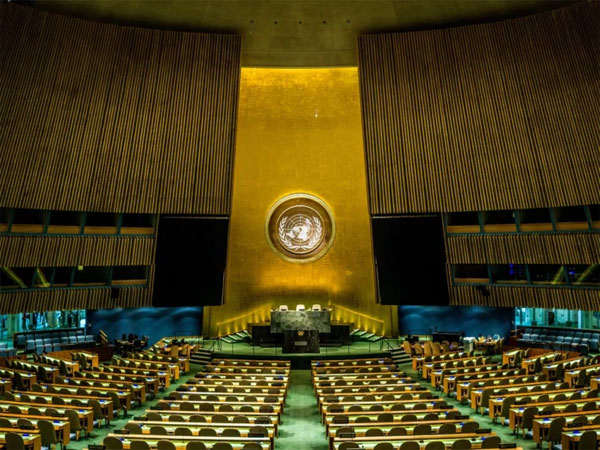Pakistan urges consensus as UNGA puts off UNSC reform discussions

“We welcome the adoption of the oral decision today to ‘roll over’ the negotiations on Security Council reform within the IGN process.,” Ambassador Usman Jadoon, deputy permanent representative of Pakistan to the UN, told the 193-member Assembly after the vote.
With the aim of “instilling new life” into the discussions on Security Council reform, the General Assembly further decided to include in its next session’s agenda the item entitled “Question of equitable representation on and increase in the membership of the Security Council and other matters related to the Security Council”.
Meanwhile, UN Secretary-General Antonio Guterres said he “very much hopes that member states, in their wisdom, will bring the process of Security Council reform to a result”.
The UN chief “has been extremely vocal, especially lately, on the need for reform, notably on the need to find a (permanent) seat for an African country on the Security Council,” his spokesperson Stephane Dujarric said in response to a question at the regular noon briefing at UN Headquarters in New York.
Full-scale negotiations to reform the Security Council began in the General Assembly in February 2009 on five clusters– the categories of membership, the question of veto, regional representation, size of an enlarged Security Council, and working methods of the council and its relationship with the General Assembly.
Despite a general agreement on enlarging the Council, as part of the UN reform process, member states remain divided over the details. The so-called Group of Four — India, Brazil, Germany and Japan — who seek for themselves permanent seats on the Council have shown no flexibility in their push for expanding the Council by 10 seats, with six additional permanent and four non-permanent members. On the other hand, the Italy/Pakistan-led Uniting for Consensus (UfC) group, which firmly opposes additional permanent members, has proposed a new category of members — not permanent members — with longer duration in terms and a possibility to get re-elected.
The Security Council is currently composed of five permanent members — Britain, China, France, Russia and the United States — and 10 non-permanent members elected to serve for two years.
In his remarks, Ambassador Jadoon also called for more active consultation with regional and sub-regional groups — including the African Union, the Arab Group and the Organization of Islamic Cooperation (OIC).
Furthermore, he said, it is vital to ensure increased representation of small and medium-sized countries, including small island developing States, in the Council and “treat Africa as a special case” to redress the historical injustice.
Ambassador Jadoon noted that this year’s IGN Co-chairs — Permanent Representatives Tareq Albanai of Kuwait and Alexander Marschik of Austria — had led to a significant expansion in the convergences and reduction of divergences on the 5 interlinked clusters.
“The Co-Chairs were also successful in promoting consensus, despite the obstructions from a particular country (obviously referring to India) on the language to be inserted on Security Council reform in the ‘Pact for the Future’,” he said. (The Pact, which is expected to be adopted at a summit next month, aims to be a roadmap for strengthening the UN’s ability to address some of the world’s biggest future challenges.)
“The discussions on the language for the Pact of the Future illustrated the difficulties in text-based negotiations in the absence of convergence on the 5 clusters,” the Pakistani envoy said, adding that text-based negotiations, as demanded by India, cannot commence, nor artificial deadlines be set until there is full convergence on the 5 clusters.
“This episode, however, revealed who among member states is responsible for impeding and obstructing the progress on Security Council reform,” Ambassador Jadoon added.
The Pakistani envoy also welcomed the accords during the current year, including that all five clusters are strongly interlinked, and therefore negotiations should be based on the principle that: “nothing is agreed until everything is agreed”; to ensure the equitable geographical representation of all regions, including cross-regional groups, such as the Arab and OIC groups; and that, if the veto cannot be abolished, it must be restricted, and not used against proposals to prevent/end genocide and other mass atrocities.
On her part, Yojana Patel, India’s Deputy Permanent Representative, criticized the “Elements Paper” prepared by IGN co-chairs, summarising the progress of the negotiations in the current session and to be the basis for continuing it as a “subjective summary” , and demanded that text-based negotiations as “the need of the hour.”
Leave a Comment